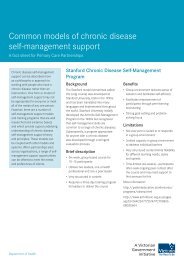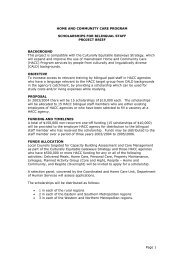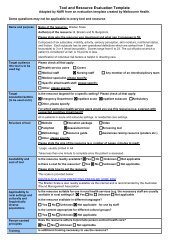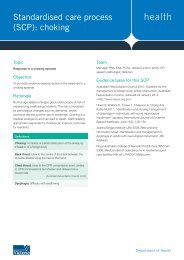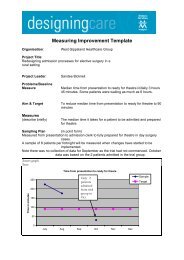Primary Health Branch policy and funding guidelines
Primary Health Branch policy and funding guidelines
Primary Health Branch policy and funding guidelines
You also want an ePaper? Increase the reach of your titles
YUMPU automatically turns print PDFs into web optimized ePapers that Google loves.
<strong>Primary</strong> <strong>Health</strong> <strong>Branch</strong> <strong>policy</strong> <strong>and</strong> <strong>funding</strong> <strong>guidelines</strong>––2006–07 to 2008–09 (2008–09 update) 13<br />
way forward (DHS, 2006). Community health services<br />
continue to develop <strong>and</strong> refine there service access models<br />
to meet client needs.<br />
Creating a system of care through engaging in partnerships<br />
is the business of every agency. As the scope of service<br />
coordination grows it is important that all agencies funded by<br />
the <strong>Primary</strong> <strong>Health</strong> <strong>Branch</strong> take an active role to improve the<br />
coordination of client care, particularly for those with chronic<br />
<strong>and</strong>/or complex conditions.<br />
To achieve this, all agencies funded by the <strong>Primary</strong> <strong>Health</strong><br />
<strong>Branch</strong> from 2006–07 to 2008–09 are required to:<br />
• actively participate <strong>and</strong> take leadership roles in PCPs<br />
• authorise <strong>and</strong> encourage staff to participate in PCP<br />
activities, where appropriate<br />
• use technology to support good service coordination<br />
practice, including e-referral <strong>and</strong> use of the Human<br />
Services Directory<br />
• provide staff with skills training in using these supporting<br />
technologies<br />
• use software that supports e-referral using the current<br />
version of the Service Coordination Tool Templates (SCTT)<br />
• pursue commercial grade connectivity <strong>and</strong> capacity to<br />
share information using SCTT<br />
• implement the Statewide Service Coordination Practice<br />
Manual (DHS, 2007)<br />
• work with the department to improve service coordination<br />
practice statewide through participation in projects such<br />
as the continuous improvement of the SCTT<br />
• provide feedback to other agencies involved in client care,<br />
including referral acknowledgement<br />
• improve the transfer of client information between agencies<br />
• record GP details on the SCTT<br />
• accept <strong>and</strong> encourage referrals from general practice<br />
using the Victorian statewide Referral Form<br />
• provide feedback to GPs<br />
• embed service coordination <strong>and</strong> integrated health<br />
promotion in agency policies <strong>and</strong> quality improvement<br />
activities<br />
• regularly update agency details in the Human services<br />
directory<br />
• participate in PCP evaluation <strong>and</strong> reporting requirements<br />
including the statewide Service Coordination Survey.<br />
3.5 Integrated chronic disease<br />
management<br />
<strong>Primary</strong> health funded agencies are required to strengthen<br />
their role in providing integrated <strong>and</strong> coordinated services for<br />
people with chronic <strong>and</strong> complex conditions. Agencies<br />
should consider the following areas:<br />
• Workforce development––ensure that staff have the<br />
appropriate knowledge <strong>and</strong> skills to support people with<br />
chronic <strong>and</strong> complex needs.<br />
• Systems change––review agency PPPS to ensure that the<br />
needs of people with chronic <strong>and</strong> complex conditions are<br />
identified <strong>and</strong> responded to in a timely, effective <strong>and</strong><br />
efficient manner. The agency PPPS should be consistent<br />
with the local PCP implementation of the Victorian Service<br />
Coordination Practice Manual (DHS, 2007).<br />
• Increase capacity––where possible, enhance service<br />
delivery responsiveness for people with chronic <strong>and</strong><br />
complex needs.<br />
Strengthening the role of <strong>Primary</strong> <strong>Health</strong> funded agencies in<br />
integrated chronic disease management is a necessary<br />
response to the increasing prevalence of preventable chronic<br />
disease <strong>and</strong> dem<strong>and</strong> pressures on services.<br />
Many <strong>Primary</strong> <strong>Health</strong> funded services across the state see a<br />
large number of people with chronic <strong>and</strong> complex conditions<br />
(approximately 60 per cent of all community health service<br />
registered clients).<br />
Care for people with chronic <strong>and</strong> complex conditions usually<br />
involves numerous health care providers in multiple settings.<br />
To provide this care within an integrated system, providers<br />
must work collaboratively to coordinate <strong>and</strong> plan care <strong>and</strong><br />
services. People with chronic <strong>and</strong> complex conditions need a<br />
responsive person-centred <strong>and</strong> effective system of care that<br />
aims to:<br />
• slow the rate of disease progression while maximising their<br />
health <strong>and</strong> wellbeing within the community<br />
• improve access to quality integrated multidisciplinary care<br />
across the care continuum<br />
• facilitate client <strong>and</strong> carer empowerment through selfmanagement<br />
programs <strong>and</strong> approaches<br />
• promote <strong>and</strong> encourage protective behaviours<br />
• actively engage GPs<br />
• reduce inappropriate dem<strong>and</strong>s on the acute health<br />
care system.





